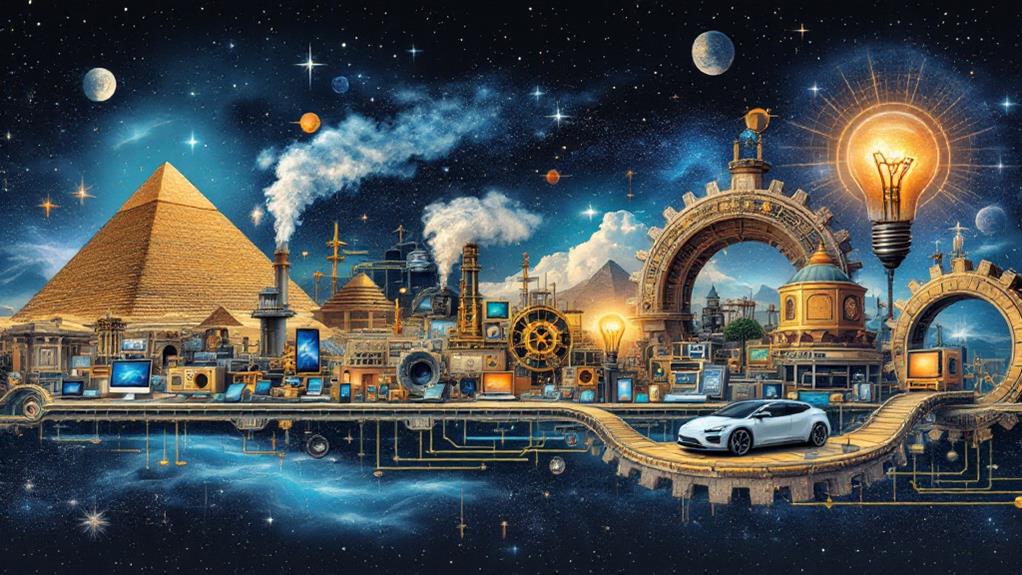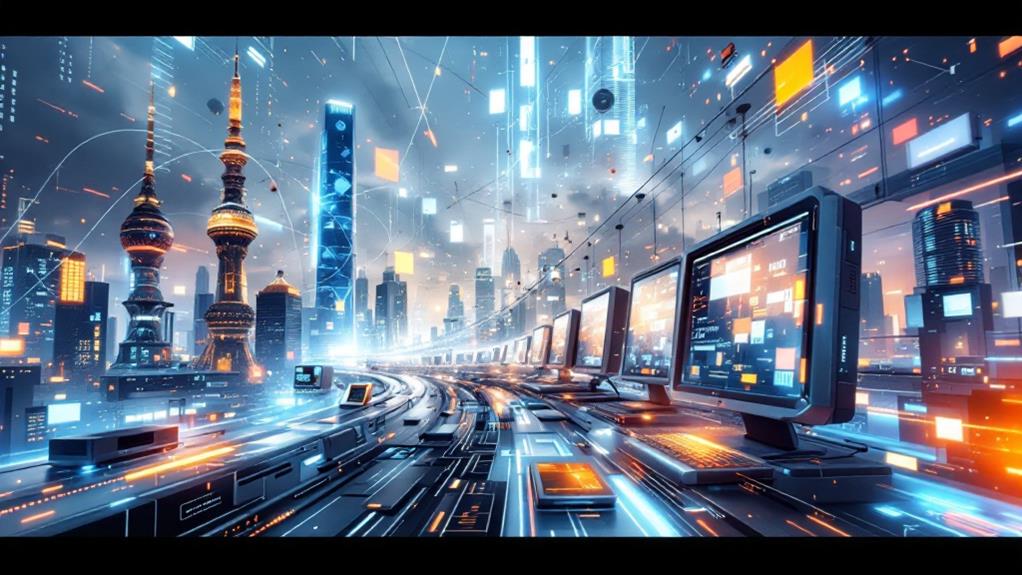The History of Engineering and Technology: Innovations That Changed the World

You've seen how engineering and technology have transformed our world, starting with the basic tools like levers and wheels in ancient times. These laid the groundwork for the monumental shift during the Industrial Revolution with steam power and mass production. Fast forward to the late 20th century, and digital technology took the stage, innovating industries and personal lives with AI and lightning-fast communication. The internet then changed everything, making the world more connected and information more accessible. As technology continues to advance with AI and biotechnology leading the charge, there's a lot more to uncover about our ever-changing world.
The Dawn of Mechanical Ingenuity
At the dawn of mechanical ingenuity, humans began transforming simple tools into complex machines that fundamentally changed how they interacted with the world. You can trace this transformative expedition back to ancient inventions, when humans initially harnessed the power of simple machines. These tools—like the lever, wheel and axle, and pulley—might seem basic today, but they were revolutionary in their time. They allowed you to exert more force with less effort, making tasks that were once laborious much more manageable.
Imagine the impact of the wheel and axle, which enabled the movement of heavy loads over long distances with ease. Or consider the lever, which gave you the ability to lift objects far heavier than you could with your bare hands. These simple machines laid the groundwork for more complex inventions, setting a foundation for future technological advancements.
The Age of Industrial Revolution
The Period of Industrial Revolution marks a vital epoch when humanity harnessed unprecedented technological advancements to reshape society. During this transformative time, you'll find that steam power emerged as a essential force. Before this period, manual labor and animal power dominated industries. However, the advent of steam engines, perfected by innovators like James Watt, changed the way energy was generated and utilized. By converting heat into mechanical work, steam power enabled machines to operate more efficiently and at greater scales than ever before.
Factory systems also became a defining feature of the Industrial Revolution. As you investigate this time, notice how these systems centralized production, bringing workers and machines under one roof. This shift from cottage industries to large-scale factories notably increased productivity. It allowed for mass production, which, in turn, brought goods to market faster and at lower costs. You'd see textiles, iron, and other industries flourish under this new paradigm, altering the economic landscape and social fabric.
In essence, the Industrial Revolution was a period where steam power and factory systems not only transformed industry but also laid the groundwork for modern engineering and technological advancements.
The Rise of Digital Technology

As humanity moved into the late 20th century, digital technology began its rapid ascent, transforming how we live, work, and communicate. You witnessed the birth of the digital transformation, which reshaped industries and daily life. Computers, once room-sized behemoths, became accessible and crucial. You no longer needed to rely on paper records and manual calculations; digital systems handled them efficiently.
Artificial intelligence (AI), a cornerstone of this transformation, emerged as a powerful tool. AI enabled machines to learn from data and perform tasks previously reserved for humans. You saw industries like manufacturing, healthcare, and finance transformed by AI-driven automation and decision-making. With digital technology, precision and speed became the norm, and creativity found new outlets.
The digital transformation didn't just touch professional life; it changed personal interactions too. Digital cameras, music players, and video games became central to entertainment. Communication evolved from phone calls to digital messages, making global connections instantaneous. You accepted digital technology in every area of life, opening doors to endless possibilities and setting the stage for future innovations. This period laid the groundwork for even greater transformations in the years to come.
The Era of Internet Connectivity
How did life change so dramatically with the advent of the internet? The internet has transformed almost every aspect of daily life. You now connect with people worldwide through social media, making friends and sharing experiences at the click of a button. Online communication tools, such as email and instant messaging, enable you to stay in touch with loved ones and colleagues effortlessly.
Consider these transformative changes:
- Remote work: You can now work from anywhere in the world, thanks to advancements in cloud computing and reliable internet connections.
- E commerce: Shopping online has become second nature, offering convenience and a vast array of products at your fingertips.
- Online education: Learning is more accessible than ever, with countless courses available online, allowing you to gain knowledge from the comfort of your home.
- Internet security: As you accept these opportunities, it's essential to stay vigilant about protecting your data and privacy.
- Data privacy: Awareness of how your information is used and shared is more significant than ever as you navigate the online landscape.
These developments have not only changed how you work and learn but also how you interact with the world, emphasizing the importance of understanding internet security and data privacy.
The Future of Technological Advancements

Imagine a world where technology continues to evolve at an unprecedented pace, reshaping every aspect of life in ways you might not yet comprehend. You'll witness artificial intelligence becoming more integrated into daily routines, from personal assistants that anticipate your needs to advanced AI systems transforming industries. Renewable energy sources will dominate, reducing reliance on fossil fuels and promoting sustainability practices that protect our planet.
Biotechnology advancements will transform healthcare, offering personalized treatments and eradicating diseases once thought incurable. Quantum computing will solve complex problems in seconds that today's supercomputers can't tackle, opening new horizons for scientific exploration and innovation. Space exploration will expand beyond the bounds of Earth, with missions to Mars and beyond becoming regular occurrences, pushing human understanding of the cosmos.
Smart cities will emerge, utilizing technology to improve infrastructure, strengthen public services, and foster connected communities. These cities will prioritize sustainability, using resources efficiently and reducing waste. Cybersecurity innovations will become essential as technology integrates deeper into our lives, ensuring the protection of sensitive information and maintaining privacy. In this future, technology won't just support our way of life; it will redefine it, creating opportunities and challenges you've yet to imagine.



